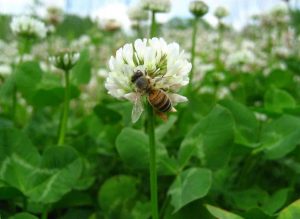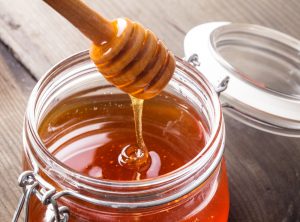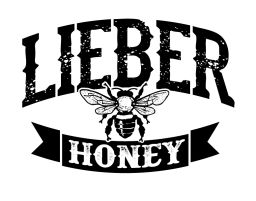The color and flavor profile of honey is affected by two primary factors: the blooms the bees forage and changes in weather that alter what’s blooming.
Most of our bees are in the Colleyville area with some in other parts of Tarrant and Denton counties, and they will forage on whatever is blooming which could include red tips, clover*, multiple types of aster flowers, other wildflowers and cultivated flowers, and many flowering bushes such as holly, vitex, and lantana. Blooming trees such as Bradford pears, basswood trees, locust trees, mesquite trees, as well as garden plants that bloom before putting on fruit like strawberries, melons, blackberries, and cantaloup also provide nectar bees enjoy.

We cannot control what the bees forage on once they are out flying around. We can put them in locations that provide a nice array of blooming plants that are known to produce good tasting honey. Bees will fly about a a two-mile radius from their hives looking for food. While we’d like to train them to only eat clover, or orange blossom (which isn’t in Texas, by the way), or wildflowers, teaching bees is very hard. They are stubborn and sting if they get mad at you. 😉
As an example of natural events affecting the honey, the Big Freeze of 2021 suppressed a great deal of the early blooms in Texas. So, the honey from that season was mostly mesquite, which is delicious with a light, sweet flavor. In another season, the red tip photinia might bloom heavily and the honey will be delicious as well, but darker in color and a bit deeper in flavor.

That is why Lieber honey not labeled as being just one kind of flower or plant. It is always the most delicious blend of local blooms that we can reasonably put our bees in front of. This also ensures that our honey has a nice blend of various pollens for those of you who are interested in honey to help with allergies.
So please keep in mind, that while the color of our honey might shift as nature shifts, it will always be the best, most delicious honey that nature, and we, can provide for you.
* We highly recommend that homeowners plant Dutch clover because it is good for your lawn and good for our bees. But please, please do not spray it or any of your yard with chemicals.
